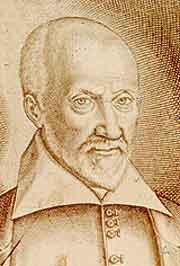
Chaeremon of Alexandria, Chaeremon the Stoic
On the Life of the Ancient Priests
「1st c. CE」Chaeremon of Alexandria, Chaeremon the Stoic, On the Life of the Ancient Priests,” 「Fragment Preserved in」 「3rd c.」 Porphyry, On Abstinence from Animal Food, Book the Fourth in The Select Works of Porphyry, trans. by Thomas Taylor (London, 1823; Google Books: Online Library of Free eBooks).
Chaeremon the Stoic, therefore, in his narration of the Egyptian priests, who says, were considered by the Egyptians as philosophers, informs us, that they…led a solitary life.…It was requisite that he who approached to them should be first purified, and abstain from any things; and this is as it were a common sacred law respecting the Egyptian priests. But these「philosophic priests」, having relinquished every other employment, and human labours…gave up their life to the contemplation and worship of divine natures and to divine inspiration; though the latter, indeed, procuring for themselves honour, security, and piety; but through contemplation science; and through both, a certain occult exercise of manners, worthy of antiquity. For to be always conversant with divine knowledge and inspiration, removes those who are so far all avarice, suppresses the passions, and excites to an intellectual life. But they were studios of frugality in their diet and apparel, and also of continence and endurance, and I all things were attentive to justice and equitably.…Their diet also was slender and simple.…They were accustomed to eat bread with hyssop, cut into small pieces.…But they, for the most part, abstained from oil, the greater number of them entirely; and if at any time they used it with pot-herbs, they took very little of it, and only as much as was sufficient to mitigate the taste of the herbs.
Many of them「the ancient priests」, however abstained from all animals; and in purifications this abstinence was adopted by all of them, for then they did not even eat an egg.…There were different ceremonies, which varied according to the class of the priests that used them, and were adapted to the several divinities. But chastity and purifications were common to all the priests. When also the time arrived in which they were to perform something pertaining to the sacred rites of religion, they spent some days in preparatory ceremonies…and during this time they abstained from all animals. (Porphry, On Abstinence From Aniaml Food 4:7, 141-142)
The Egyptian priests, thought the proficiency which they made by this exercise, and similitude to divinity, knew that divinity does not pervade through man alone, and that soul is not enshrined in man alone on earth, but that it passes through all animals. On this account, in fashioning the images of the Gods, they assumed every anima, and for this purpose mixed together human form and the forms of wild beasts…some of which had an inferior position, but other a superior position; through which they manifested that these {i.e. brutes and men」, through the decision of the God, communicated with each other, and that tame and savage animals are nurtured together with us, not without the concurrence of a certain divine will. Hence also, a lion is worshipped as a God, and a certain part of Egypt, which is called Nomons, has the surname of Leontopolis 「or the city of the lion」, and another is denominated Buriris 「from an ox」, and another Lycopolis 「or the city of the wolf.」. For they venerated the power of God which extends to all things through animals which are nurtured together, and which each of the Gods imparts. (Porphry, On Abstinence From Aniaml Food 4:9, 143-145)
It is requisite to abstain from man, so, likewise, from other animals. And father still, the Egyptian priests, from their transcendent wisdom and association with divinity, discovered what animal are more acceptable to the God 「when dedicated to them」 than man.…A beetle will be detested by on e who is ignorant of and unskilled in divine concerns, but the Egyptians venerate it, as an animated image of the sun. For every beetle is a male, and emitting its genital seed in a muddy place, and having made it spherical, it turns round the seminal sphere in a way similar to that of the sun in the heavens. It likewise receives a period of twenty-eight days, which is the lunar period. In a similar manner, the Egyptians philophize about the ram, the crocodile, the vulture, and the ibis, and, in short, about every animal; so that, from their wisdom and transcendent knowledge of divine concerns, they came at last to venerate all animals. (Porphry, On Abstinence From Animal Food 4:9, 143-145)
Animals should be reverenced「as images of the Gods」, viz. that the soul of every animal, when liberated from the body, was discovered to be rational, to be prescient of futurity, to possess an oracular power, and to be effective of every thing which man is capable of accomplishing when separated from the body. Hence they very properly honoured them, and abstained from the as much as possible. (Porphry, On Abstinence From Animal Food 4:10, 145-146)
_____
Chaeremon was chief librarian of the Alexandrian library. He afterwards became one of Nero’s tutors.



